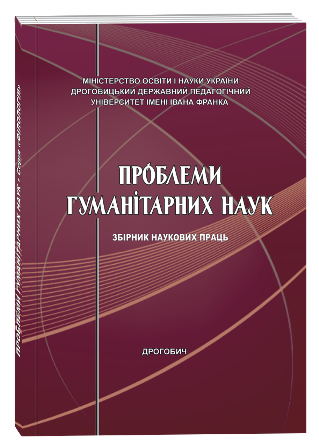TYPOLOGY OF ETYMOLOGICAL LITERALISM
DOI:
https://doi.org/10.24919/2522-4565.2023.56.3Keywords:
etymological literalism, interference, literalism, translator’s false friends, typology.Abstract
Summary. The description of literalism problematics is an age long tradition. Notwithstanding this fact, many dimensions of etymological literalisms or translator’s false friends have been open for academic research both in theoretical and practical aspects. The article focuses on such kind of literalisms as etymological literalisms and explores their definition and typology. The subject matter of this article is crucially topical and reflects the current demand of modern theory of translation for new and profound research in this sphere.The objective of the article is to describe etymological literalisms through the prism of modern Translation Studies. The objective determined the tasks of the research: to define the term “etymological literalism” and to classify their multifaceted essence. Our study relies substantially on the application of linguistic descriptive methodology and devices. The innovation of this article lies in specifying the quintessence of etymological literalism notion which is relevant for understanding the translation interference mechanism and crucial for modern Translation Studies; highlighting and analyzing different types of etymological literalisms. The article claims that etymological literalisms are the result of interference between two languages which leads to translation mistake of usage of externally similar word or word combination that doesn’t respond in meaning to corresponding word in the original. Various factors of etymological literalisms origins contribute to their types selection: English polysemantic word coincides with the Ukrainian one not in all meanings but in one or two; Ukrainian word has meanings that are absent in an English word; both English and Ukrainian words have besides common their unique meanings; similar in form English and Ukrainian words do not have common meanings.
References
Безпалова К. В., Коваленко О. В. Інтерференція, буквалізм і буквальний переклад : визначення та розмежування. Abstracts of the II International Scientific and Practical Conference «Creation of new ideas of learning in modern conditions», September 25–27, 2023, Bordeaux, France. Р. 193–195.
Бучумаш А., Дерік І. Проблема неперекладності, шляхи ії подолання у перекладі. Науковий вісник ПНПУ ім. К. Д. Ушинського. 2022. № 35. С. 18–29.
Волошок І. Ю. Інтерференція та її типи на різних мовних рівнях. Педагогічні науки : збірник наук. праць. 2012. Вип. 62. С. 81–85.
Гринько О. С., Коваленко О. В. Чинники, що зумовлюють буквалізми. Сучасні виклики та актуальні проблеми науки, освіти, технологій і суспільства : збірник тез доповідей міжнародної науково-практичної конференції, Ізмаїл, 6 жовтня 2023 р. : у 2 ч. Ізмаїл, 2023. Ч. 1. С. 47–49.
Коваленко О. В., Чернова Ю. А. Типологія лексичних буквалізмів. Interdisciplinary research : scientific horizons and perspectives : collection of scientific papers «SCIENTIA» with Proceedings of the VI International Scientific and Theoretical Conference, October 13, 2023. Vilnius, Republic of Lithuania. Р. 46–49. DOI : https://doi.org/10.36074/scientia-13.10.2023
Матузкова О. П. Перекладацька хвороба буквалізму та як з нею боротися. Записки з романо-германської філології. Одеса, 2007. Вип.18. С. 80–91.
Матузкова О. П., Коваленко О. В. Інтерференція у перекладі. Conference Proceedings. The IV Internаtional science conference ’Science, people and the latest technologies” October 09–11, 2023. Sofia, Bulgaria, 2023. С. 159–161.
Раєвська І. В., Коваленко О. В. Типологія етимологічних буквалізмів. Наукові тренди постіндустріального суспільства : матеріали III Міжнародної наукової конференції, м. Харків, 13 жовтня, 2023 р. Вінниця : ТОВ «УКРЛОГОС Груп, 2023. С. 90–92. DOI: https://doi.org/10.36074/mcnd-13.10.2023
Рибіна Н. В. Білінгвізм та інтерференція як тенденції мовного розвитку сучасного суспільства : проблеми та способи їх вирішення. Наукові записки Національного університету «Острозька академія». 2015. № 59. Т. 1. С. 176–178.
Ролік А. В., Лєпухова Н. І., Блажко М. І. Буквалізми та інші перекладацькі помилки. Література та культура Полісся. Серія «Філологічні науки». 2021. Вип. 104. № 19. С. 164.
Скиба С. М., Чичкан О. С. Запобігання буквалізму при відтворенні комунікативного завдання заголовка інформаційного повідомлення у трансляті. Вісник СумДУ. 2006. № 11(95). Том 1. С. 192–198.
Шаблій О. А. Міжмовна інтерференція як психолінгвістична універсалія. Мовні та концептуальні картини світу : Зб. наук. праць. Київ : Вид. дім Дмитра Бураго, 2004. Вип. 11 (1). С. 371–375.
Яровенко Л. С., Кирилова М. Д. До проблеми перекладацької інтерференції. Нова філологія. 2010. Запоріжжя : ЗНУ. Вип. 41. С. 208–213.
Bell R. T. Translation and translating. Longman, 1997. Duff A. Translation. Oxford University Press, 1996. 160 p.
Newmark P. A. A Textbook of Translation. Longman, 2006. 290 p.



